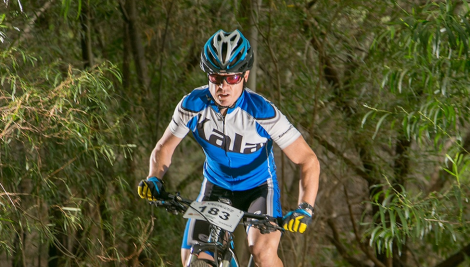Australia is a vast country, where great distances can need to be covered to travel between cities. Australia is also a country with highly a centralised population, most notably in the South East corner of the country. The size of the country and the spread of our population dictates transport and utilities infrastructure – and it even shapes the mountain bike racing. Marathon Stage Racing has flourished in countries around the globe. There are enough Stage Races to keep even the most hardened professional happy in South Africa. North America has a collection of Stage Races that draw riders for the terrain, trails and organisation. The classic routes raced on Transalp are enjoyed year after year in the European Alps.
- Riders together on stage four © Craft Bike Transalp/Peter Musch
Yet, in a country with vast amounts of open space, our most successful Stage Races err towards the cross country style. The Cape to Cape is the most recent example, with a field of 1200 riders set to flock to Western Australia in late October. The Ingkerreke Commercial MTB Enduro (ICME) experienced high numbers of entrants years ago and is experiencing an increase in popularity again. The Hell Fire Cup in South East Tasmania looks set to become another popular race, with a split stage, paired racing format. All these races use a centralised location.
The Crocodile Trophy is well known to most European Marathon Stage Racers – and if you are Australian, and racing in Europe, chances are you will be asked if you have done it. Be prepared for the disappointed looks if you can’t confirm that you have had the ‘full Croc experience’.
Justin Maddog Morris. Riding the pain train at the 2011 Croc Trophy. This epitomises the Full Croc Experience. Photo: Regina Stanger
Although this race has changed guise since it began, it remains true to a few details. ‘The Croc’ is a point to point race, through the outback, taking riders on a physical journey that allows them to experience a large stretch of Far North Queensland. It’s remote country, and the relative lack of amenities and creature comforts are the polar opposite of one of the worlds other great Marathons Stage Races – the ABSA Cape Epic.
The lead bunch during stage 2 of the 2013 Absa Cape Epic
Photo by Nick Muzik/Cape Epic/SPORTZPICS
In 2014, two avid Western Australian mountain bikers are launching the 2 Oceans MTB Race, attempting to create a Marathon Stage Race that offers racers the experience they might get if they were to be at the Cape Epic. The Epic offers some of the hardest endurance racing an amateur mountain biker can imagine. But it also offers the best rider services. From ice baths, to air-conditioned lounges, vast quantities of fresh food, extensive wi-fi so you can upload your race to Strava or just ‘check in’ to the camp via Facebook, there is very little to desire at the Cape Epic, except a day off and maybe a good pad-thai or some sushi.
With the opening of the Munda Biddi Trail, which traces 1000km from Perth to Albany, a perfect route has been created. By utilising an extra 200km of trails, race organisers Chris Neal and Charles Biddle have a 1200km point to point route that can showcase the Australian environment over a 10 day Marathon Stage Race.
Speaking to a variety of experienced Australian Marathon and Stage Racers, there is a mix of excitement and uncertainty on what could be delivered at the 2 Oceans MTB Race.
Looking over the race website, Imogen Smith sensed that the organisers have the athletes best interests in mind.
“I think Australia is crying out for a ‘friendly Croc’. A race with great organisation and support and great trails, but that also offers all the rewards that come from completing something more challenging than normal people could or would attempt. A brilliant idea. Their goals for the race are spot on: tent villages in different towns, the full service race, massage, bike servicing, ‘carby’ food – these are the first things racers think about and they seem to have it covered. You get the impression you’d be well-looked-after in their hands.”
Creature comforts after a long day are important at Stage Races. A chair, some shade, fluid and food. MINIMUM.
Andrew Hall was also enthusiastic in his response, “the biggest draw card for me is the big miles and 10 days . I having been looking for a super tough stage race like this.” Yet as an Elite racer who works full-time, he remains realistic with the justification of days off work vs reward, “I hope there is good prize money on offer . None of the BS free entry for next year!”
- Fun racing for Andrew Hall. Photo: Gilbert Romane
There is a similar sentiment from Jodie Willet, “10 days is a big commitment so the prize money would have to be substantial.” With travel costs, race entry and time away from the real world, having an appropriate reward for the race winners is important to draw the best racers.
Jodie Willett – big stage races need to provide a return on investment for all racers.
Of course the usual concerns are there from experienced racers. Ash Hayat has been there, done that, and learnt enough about Marathon Stage Racing to fill chapters in a ‘How-To‘ book.
- Ash Hayat – after stage 6 at the 2011 Croc Trophy. Photo: Pete Figg
“They really need to be careful about delivering quantities of food easily with minimal wait time, along with showers and toilets etc. Good campsites with good access to amenities is important. If possible, close to towns with supermarkets, cafes and restaurants. Clever bag logistics are essential to minimise time spent without bags.”
It is clear the excitement is there amongst a selection of Australia’s Elite racers. But there is a need to draw an international field.
It looks like Chris and Charles are set to predict and leap the hurdles they face. They understand the need to offer both premium and basic accommodation packages for the variety of riders they want to attract, and promise that the riding experience will match with the Australian mountain biking experience, taking in forest and singletrack, not endless corrugations in the desert.
This isn’t an outback race through the desert. Stages finish in towns, with comfortable amenities available.
With pricing capped at $AUS1990 for the race package including buffet meals (with specific dietary requirements catered for) and tented accommodation with stretchers large enough for ‘big and tall’ people. The Premium package using B&B’s, pubs and other local accommodation will be at an additional cost.
While the entry cost isn’t a small amount of money, it is also remarkably good value for 10 days of racing, accommodation and meals. Do the sums – an Australian Marathon race will usually cost $140 to enter, and staying somewhere for less than $60 per head is not always possible. Although that may be self-catered accommodation, there will still be anywhere from $15 to $50 additional on food expenditure around a one day race. At already over $200 for a one day race, this is higher than the $199/day average of the 2 Oceans MTB Race, and it doesn’t even take transport into account. While Perth is the most isolated capital city in the world, the frequency of flights and number of carriers means that flights can become relatively affordable. Certainly the combined price of entry, accommodation and transport will still be less than a trip to South Africa, Europe or North America.
The challenge now is for Chris and Charles to deliver the Marathon Stage Race that Australia needs. We have the terrain, we have the riders, and withe the Munda Biddi trail and support from the Shire of Manjimup and South West Commission, the future is bright.
For full race details, visit the 2 Oceans MTB Race website. We will feature the course, and logistical support in coming features.

